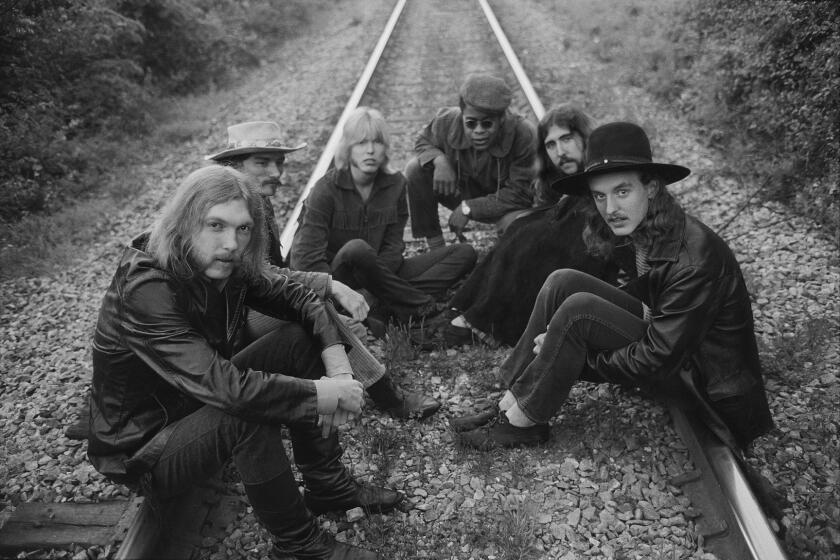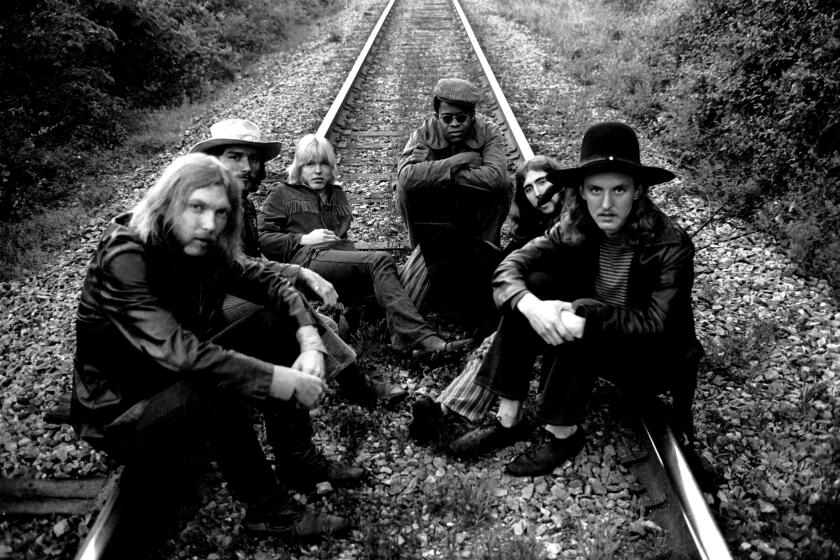Dickey Betts, guitarist and founding member of the Allman Brothers Band, dies 80

Dickey Betts, the guitarist and co-founder of Southern rockers the Allman Brothers Band, died Thursday of cancer and chronic obstructive pulmonary disease. He was 80.
In statement posted to Betts’ website, the musician’s family said he died at home in Osprey, Fla. They said Betts was a “legendary performer, songwriter, bandleader, and family patriarch.
“Dickey was larger-than-life, and his loss will be felt worldwide.”
It began like a blues lyric: Gregg Allman hustled up a paper route and used the money to buy a $21.95 Silvertone guitar from Sears.
While the group’s titular brothers were the frontmen, Betts’ ferocious and stylish playing gave the group its distinct flavor of harmonized guitar solo, tempered with the jazz and country influences that made the Allman Brothers such influential, cross-genre favorites of the era. Betts wrote and sang on several of the group’s most beloved singles, including “Ramblin’ Man” and the instrumentals “Jessica” and “In Memory of Elizabeth Reed.”
Born in West Palm Beach, Fla., Betts proved a fast study on guitar, banjo and other instruments. He formed a group called the Second Coming with bassist Berry Oakley, who later introduced him to Duane Allman. Betts joined the Allman Brothers Band in 1969, and quickly made his mark with both his outlaw good looks and his writing on songs like “Revival” and “Blue Sky” as the band became a global superstar of the southern rock movement alongside peers such as Lynyrd Skynyrd.
After Duane Allman’s death in a 1971 motorcycle crash, Betts uneasily became a co-frontman, though albums like the Allmans’ 1973 smash “Brothers and Sisters” and his rangy 1974 solo LP “Highway Call” proved he could find both commercial success and critical acclaim in his new role.
Alan Paul’s ‘Brothers and Sisters: The Allman Brothers Band and the Inside Story of the Album that Defined the ’70s’ tells the story of a great comeback album.
Betts had a fan in then-President Carter. In one memorable meeting at the White House, where Betts was attending a jazz performance, “Jimmy was walking around the premises and someone said to me, ‘Go over and talk to him,’ but I didn’t want to bother him,” Betts told Rolling Stone. “Then I went to use the men’s room in the White House, and as I was coming out, I ran into Jimmy with a group of people and he said, ‘Ladies and gentlemen, this is Dickey Betts, one of the best songwriters around nowadays.’ That just floored me.”
After the band fell apart in the late ‘70s (in part over a drug trial involving a band employee), Betts recorded with his group Great Southern, while the Allmans reunited briefly in 1979 and again in 1989, finding renewed critical and chart success and performing at Woodstock ’94. He was widely credited as the inspiration for Billy Crudup’s character of Russell in Cameron Crowe’s film “Almost Famous.”
Yet Betts’ temper and substance use — long part of rock ’n’ roll legend — became a liability in the group. He was arrested several times over the decades for fighting with police officers, and in 2000 he left the band. “The Allman Brothers Band deserved a better ending than this. We’ve done so many great things, stuck together through all these things,” Betts told the Hartford Courant in 2000.
Twenty years after it first ignited a mass rock audience, the signature sound of the Allman Brothers Band remains fresh and exciting.
The Allman Brothers Band continued touring (with guitarists Warren Haynes and Derek Trucks), while Betts retired and un-retired from performing. In 2018, Betts canceled live dates after suffering a stroke and slipping in his backyard, injuring his head in what his family described as a “freak accident. Dickey is a notorious fighter and he is displaying that now.”
Betts is survived by his wife, Donna, and four children, Duane (also an acclaimed singer-songwriter), Christy, Jessica and Kim.
Swift’s 11th studio LP, ‘The Tortured Poets Department,’ released at midnight Eastern time, follows a busy period in the 34-year-old’s personal and professional spheres.
More to Read
The biggest entertainment stories
Get our big stories about Hollywood, film, television, music, arts, culture and more right in your inbox as soon as they publish.
You may occasionally receive promotional content from the Los Angeles Times.














